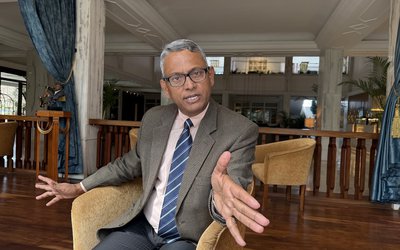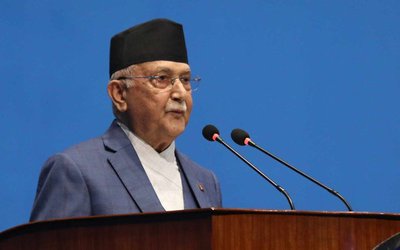
As it is said, a friend in need is a friend indeed. Japan has truly stood as a friend in need, supporting Nepal at all times of crisis. Under its JDS program, Japan came this year to support Nepal as well.
As Nepal has been going through a drastic change in the forms of government and institutions, there is the need to have strong and capable civil servants to understand and deal with the new situation.
That is where the training for young civil servants comes to be of note. Realising the importance of training, Japanese Government, under the JDS fellowship, has been providing higher education in Japan for civil servants for the last three years.
As 40 Nepalese civil servants have already been engaged in this program, twenty Nepalese young bureaucrats have left to pursue higher education in Japan.
Japanese Ambassador to Nepal Masamichi Saigo hosted a reception to bid farewell to the twenty Nepalese selected for The Project For Human Resource Development Scholarship by Japanese Grant Aid (JDS 2018) at his residence.
This is the third batch of Nepalese students. Earlier, 40 Nepalese government officials had already received this scholarship.
At the function, attended by secretaries of different ministries, joint secretaries, media persons and nominees, Japanese ambassador to Masamichi Saigo said that the participants will greatly contribute to institutionalize the Nepalese system following their study in Japan. “Those selected will receive international level education during their study in Japan.”
Joint Secretary of Ministry of Finance and Chief International Economic Cooperation and Coordination Division Shree Krishna Nepal thanked Japan government for the continual support in the development sector. “The fellows will be assets for us when they come back after pursuing their courses in Japan’s highly prestigious universities,” said Nepal.
Jun Sakuma, Chief Representative at JICA Nepal Office, said that the fellows will help Nepal’s development process.
The Project for Human Resource Development Scholarship by Japanese Grant Aid (JDS) started in Nepal in 2015. Up to the present, a total of 60 Fellows have been sent to Japan under the scheme.
The JDS fellow are section officers representing various ministries of Nepal. Those include Ministry of Foreign Affairs, Home, General Administration and Federal Affairs and Local Development, Ministry of Law Justice and Parliamentary Affairs, Finance, Industry, Commerce and Supply, Vigilance Commission and Education Science and Technology.
JDS is now inviting potential applicants who understand its aims and are interested in a 2-year master’s degree program at Japanese universities for the academic year 2018—2019. The course instruction will be in English. The number of dispatches is 20 per year.
The Project for Human Resource Development Scholarship by Japanese Grant Aid (JDS) (former Japanese Grant Aid for Human Resource Development Scholarship (JDS)) is to support human resource development of the Japanese grant aid recipient countries. JDS Project targets the highly capable young officials (mainly government) who are expected to engage in implementing social and economic development plans as a future leader.
JDS Fellows are also expected to contribute to the enhanced bilateral relations between their countries and Japan, with well-rounded knowledge of Japan.
JDS Project offers 2-year Master's courses at Japanese Universities in English. JDS Fellows will get a special opportunity for directly learning at the forefront of knowledge in the technological environment as well as for building the wide human networks.
According to the JDS Website, JDS Fellows will have a great opportunity to learn the expert knowledge for policy making and institutional building for the country's development as well as systems in the world-leading technological country. Also the Fellows will benefit from the wider human network.
The Fellows' workplace will attain the highly-capable & motivated returnees who would effectively contribute to the organizational missions. The Fellows' country will improve institutional capability, which leads to foster the development.
- AMBASSADOR CHANDRA KUMAR GHIMIRE:Economic Diplomacy
- Nov 30, 2024
- PM Oli's Visit To China: Geopolitical Implications
- Nov 19, 2024
- NEA: Kul Man Ghising, A Cool Man
- Oct 28, 2024
- DASHAIN FESTIVAL : Festival of Unity
- Oct 04, 2024
- NEPAL-CANADA Bilateral Meeting
- Oct 04, 2024
















